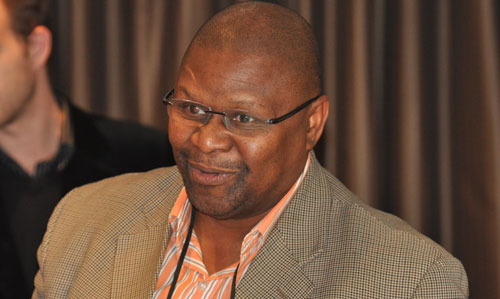
Government is not specifically targeting BlackBerry maker Research in Motion in its proposed attempts to allow law enforcement agencies, through the courts, to intercept the communications of the text messages of suspected criminals, communications deputy minister Obed Bapela says.
On Monday, Bapela told delegates at Telkom’s annual Satnac conference in East London that government was considering a change to legislation to allow the SA Police Service to get access, through court orders, to the records of people using the popular BlackBerry Messenger (BBM) service.
He said “a lot of criminality” was happening on BBM, an instant messaging platform for BlackBerry smartphones that has caught on like wildfire in SA in recent years.
“We might have to follow Britain and Saudi Arabia to say we need to have [access to] a decryption system if crimes are committed [using the BlackBerry service],” he said.
In a follow-up interview with TechCentral, Bapela explains that the debate around encrypted cellphone messaging systems was first introduced “a year or two ago” by the minister of state security, Siyabonga Cwele. “People saw devil’s horns all over that, so he retreated,” Bapela says.
The plan is now being revisited and driven by the department of communications as part of its plans to introduce new policies to tackle cyber crime, he says.
“Because BBM is an encrypted environment, people have begun to use it to plan and operationalise criminal activities,” Bapela tells TechCentral. “That is a concern that the law enforcement agencies are raising with government through the joint cluster on peace and security.”
He says government wants to “find a solution with BlackBerry” and assure ordinary consumers the plans have nothing to do with the state wanting to spy on them. “We will open a debate on the issue. Whatever fears people express, we will … need to give them assurances so we can build trust in the use of technology in SA.”
Bapela says government is not specifically targeting the BlackBerry platform, but rather any company that offers encrypted systems that can be used to commit crime. “Government mustn’t compromise people’s privacy.”
Civil unrest in Syria, Egypt, Yemen, Libya and other parts of the world this year has played no part in government’s thinking on the issue, he adds. Social communication systems like BBM, Twitter and Facebook have played an important role in helping protestors organise demonstrations against autocratic governments. “We are a democracy,” Bapela says. “We are not [trying to] suppress freedom of expression.”
He says government has not yet engaged with Research in Motion on the issue. But he says it will be discussed in cabinet this year, with the required changes the law to be introduced before the end of March next year. — Duncan McLeod, TechCentral
- Subscribe to our free daily newsletter
- Follow us on Twitter or on Facebook




